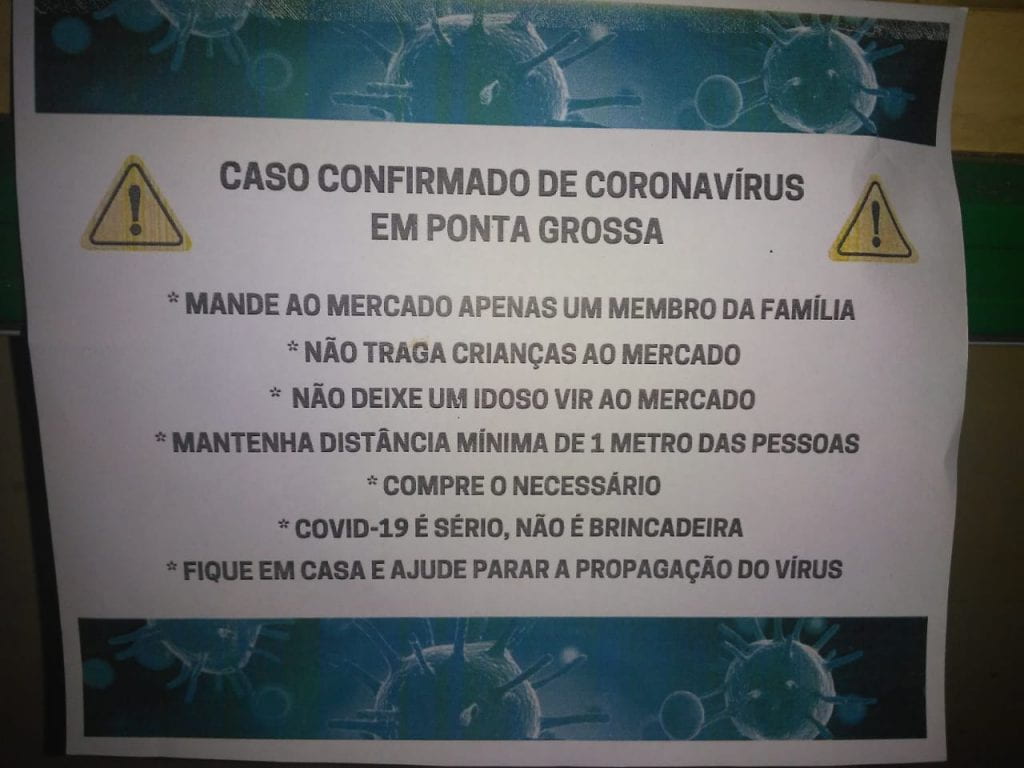21 March 2020
We have to go buy some medicine for my mother-in-law and since we were going out anyway, we asked one of our elderly neighbours if he needed medicine as well. We were thinking about helping people who are part of the high risk group.
While we walk through the city center we see lots of elderly people sitting in the city square talking, while children play in the playground nearby and people buy clothes as usual. It seems that nothing is happening, like it is a big holiday.
Pharmacies lack medicines, masks and alcohol-based hand sanitizer. I fear that things get worse, and that I will not be able to find in the coming days even some of the very necessary supplies for my family and I.
When I get home, I clean our wallets and cell phones, wash the clothes used during the day, and go straight to the bath. With many confirmed cases and few ICUs (Intensive Care Unit) in the whole city (196 ICUs for a population of 300.000 people), the fear of getting infected and perishing is great.
An unproductive day for my thesis. I have too many concerns regarding the coming days, the end of my scholarship funds and about distant family and friends.
23 March 2020
Today, I’m indoors, felling extremely anxious and with no appetite at all. While we have been informed that the number of cases has gone bigger in the country, we are trying to keep things normal for our seven year old son.
This made me think about something related to my Ph.D research. I was thinking about how Rio de Janeiro’s population during the 19th century was feeling regarding the epidemics then, how they were afraid of going outside, of being in a epidemic environment and becoming ill.
I worked on my thesis until 17:00, and now I need to buy some bread. Once I get to the supermarket, I find that they are limiting the number of people who must enter and are constantly cleaning the baskets. The prices of milk, eggs and toilet paper have increased by about 25%. The floor is full of red X’s and the first thing that comes to mind is the sentence “the X marks the spot”. The place is full of signs where one can read:

Ponta Grossa has its first COVID-19 confirmed case. Do the following for your safety:
* Send just one family member to the supermarket
* Don’t bring children to the supermarket
* Don’t let an elderly person come to the supermarket
* Keep a 1 meter distance from other people
* Buy only necessities
* Covid-19 is serious and not a joke
* Stay home and help to stop the disease
People are afraid of touching each other in the aisles, in lines and during payment. In the checkout line, a man who appears to be very ill, coughs constantly without covering his mouth. He looks at everyone in the queue and says, “I’m not feeling very well…” Everyone looks at each other even though they know he may not have COVID-19. His lack of care concerning transmission makes me feel a mixture of anger and fear.
I got home, remove my clothes, put them in the washing machine and go to the shower. I’m feeling anxious, like something is pressing on my chest right above where my heart is, and not even the Prozac I take daily is helping. It seems that the outbreak finally reached my neighborhood.
24 March 2020
Someone nearby had to have been burning some dried wood and maybe some plastic because the smoke that came through the air smelled like burned plastic. Because of that, my allergies start to annoy me. I stayed the whole day inside my house, so nothing else in particular happened.
<< Previous Next >>
Diary Project: Ponta Grossa (2)
Lucas Erichsen is finishing his Ph.D. in Social History at the Federal University of Rio de Janeiro. He is based in Ponta Grossa – Paraná. His doctoral project deals with the history of slaughterhouses in the city of Rio de Janeiro during the 19th century using the environmental history, history of science and the human-animal history as the main theoretical tools. One part of the project, developed while undertaking a fellowship at the MPIWG, concerns the history of the first public slaughterhouse of Rio de Janeiro between 1808 and 1853.
* * *
The Teach311 + COVID-19 Collective began in 2011 as a joint project of the Forum for the History of Science in Asia and the Society for the History of Technology Asia Network and is currently expanded in collaboration with the Max Planck Institute for the History of Science(Artifacts, Action, Knowledge) and Nanyang Technological University-Singapore.
![[Teach311 + COVID-19] Collective](https://blogs.ntu.edu.sg/teach311/files/2020/04/Banner.jpg)